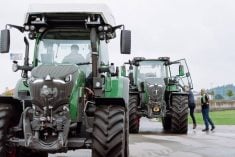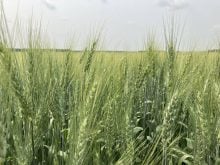Volunteer canola stands blooming in rain-soaked fields have producers wondering whether the crops are worth harvesting.In parts of Saskatchewan, particularly the eastern half, unseeded fields are producing uniform stands of volunteer canola, according to the Canola Council of Canada.However, Jim Bessel, senior agronomist with the council, said producers considering harvesting volunteer canola should weigh their options carefully.The council recommends that producers first check on the legality of harvesting volunteer canola.”I think most growers that have ever grown canola will understand that volunteer canola doesn’t normally produce anything near what you would consider optimal (yields),” said Bessel.”We know that there are certainly some (growers) out there that are considering allowing their fields to go that route, only because they don’t really have any other choice right now … but this is such a radical approach (to canola production) that expectations should be very minimal.”Some producers who seeded a fraction of their normal acreage this spring are looking at volunteer canola as an opportunity to capture value from residual inputs.However, volunteer canola stands that look good in early summer and have acceptable plant densities may not have the vigour to compete given the heavy weed infestations that exist.”Weed growth is going to be rampant,” said Bessel.He warned that volunteer crops are more prone to disease because the seed hasn’t been treated.In addition, the genes that confer herbicide tolerance may be lost or weakened in second and third generation crops.According to the council, only 80 to 90 percent of volunteer plants produced from second generation hybrid seed will retain herbicide tolerance.As a result, spraying volunteer stands would reduce plant densities and further limit the prospects of harvesting a decent volunteer crop.Producers hoping to assess the yield potential of volunteer canola should assess plant densities throughout the field and carefully gauge the crop’s ability to compete with weeds.If plant densities are sufficient and fields are accessible, spraying might be an option, even if 10 to 20 percent of plants lack herbicide tolerance.According to Murray Hartman, provincial oilseed specialist with Alberta Agriculture, volunteer canola does not usually produce a high yielding crop but fields with plant densities of 0.5 to one plant per sq. foot in areas between the chaff rows could produce a medium yielding stand under the right conditions.”As far as agronomics is concerned, volunteer canola doesn’t generally produce a good crop … but even a mediocre crop can be better than nothing at all and unfortunately, that’s what some producers are looking at,” he said.Producers who have potentially viable stands must also weigh the costs and efficacy of top dressing fertilizer and applying chemicals to a crop that has high weed densities.”How are you going to spray it and how are you going to fertilize it?” Hartman asked.”I’ve only been on a few fields over the years where guys have kept volunteer canola crops and they’ve always had fairly mediocre yields, maybe 20 bushels or 25 bu. per acre but again, if you’re comparing that to nothing at all, it’s still pretty good.”According to Bessel, companies that have patents on canola traits may have policies to prohibit the growth, harvest and sale of second generation or volunteer crops.Trish Jordan, public affairs director with Monsanto Canada, said Monsanto does not encourage the harvest of volunteer canola varieties that use Roundup Ready technology but the practice will be permitted if producers register their volunteer acres by July 15 and sign a volunteer technology use agreement.Jordan said producers who plan to harvest a volunteer crop should contact Monsanto’s Custom Care Line.Producers who register and sign a volunteer TUA will be billed $15.65 an acre.Those who fail to sign an agreement and choose to harvest a volunteer crop anyway will be in violation of their technology use agreement.Jordan said a similar situation arose in Manitoba in 2005 when farmers were unable to get onto their fields.That year, about 20 to 30 farmers signed the volunteer TUA and harvested a volunteer crop.This year, the company already has fielded numerous calls, she said.”A lot of growers have been calling … for a number of weeks so this has obviously been on our radar for a while.”Rod Merryweather, North American oilseeds manager with Bayer CropScience, said his company has not finalized a policy on harvesting volunteer Liberty Link canola varieties.Bayer officials are discussing the issue and will likely make a decision within the next few weeks.
Read Also

Why feds imposed EV tariffs
Moe and Kinew have a fight on their hands when it comes to eliminating the EV tariff. Canada has to worry about pissing off the U.S. and Mexico and hundreds of thousands of auto workers.















